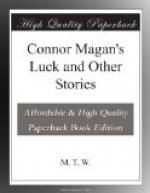When the dripping logs were long and heavy, it was the custom to fasten them with the rope close to a stake in the bank, and leave them floating. At low water they were left high and dry on the sand.
No other drift-wood gatherers meddled with such logs. They were considered as much private property as if already burning on the hearth.
“I’m going up the hill to feed the cow, Connor,” said his father, after a great deal of wood of every size and shape had been landed. “Mind what you are about, and take care of Larry’s gim of a boat. It was mighty neighborly to lind it for the whole day. See now, how much drift you can pick up by yourself.”
Connor felt the responsibility, and worked diligently. He had twice taken a load to shore, and was quite far again in the stream, when he saw a strange sight. It was not Moses in the bulrushes, to be sure—but a child in a wicker wagon, floating down the current amid a lot of sticks and branches. The hoarse whistle of a steamboat near meant danger; and to the eye of Connor the baby-craft seemed but a little above the water, and to be slowly sinking.
Connor’s shout rang back from the Kentucky hills as if it came from the throat of an engine.
No one answered.
There were great logs between his skiff and the child—logs and child were all moving together. Should he abandon Larry’s precious boat?
Connor could not consider this. He plunged into the water and swam round the logs. He never knew how he did it—he never knew how he cut his hand—he never felt the pounding of the logs—he only knew that he caught the wagon, kept those black eyes above the water, and pulled the precious freight to shore. Then, while the water was streaming from him in every direction, he sprang up the few steps to his mother’s cabin, and without a word placed the child, still in the wagon, inside the door!
Running back as swiftly as his feet would carry him, Connor had the good luck to find the deserted boat close to shore, jammed in a mass of drift-wood, just in the turn of the Riffle.
Dragging it up and along the shore, he fastened it to a fisherman’s stake just by Twinrip. Then Connor felt he had discharged his duty—Larry O’Flaherty’s boat was safe—high and dry out of reach of eddying logs.
Now, eager, dripping, and breathless—with eyes like stars, he flew home again.
“Oh, mother,” he said, “she’s fast to the post and not a hole knocked into her, and ain’t her eyes black and soft as our mooley cow’s and I found her before the General Little ran her down—and I’m going to keep her always—I found her—isn’t it lucky we have a cow?”
What the boy said was rather mixed—you could not parse it, but you could understand it.
The baby’s big black eyes looked around, and she acknowledged a cup of milk and her deliverer by a smile. It was a strange group. In the midst of a puddle of water Mother Maggie was leaning over the new comer and trying to untie the numerous knots in a shawl which had kept the child in her wicker nest. Little Mike was staring open-eyed at the beads round baby’s neck, and at the coral horseshoe which hung from them. The pretty little girl seemed quite contented, and with the happy unconsciousness of infancy was evidently quite at home.




